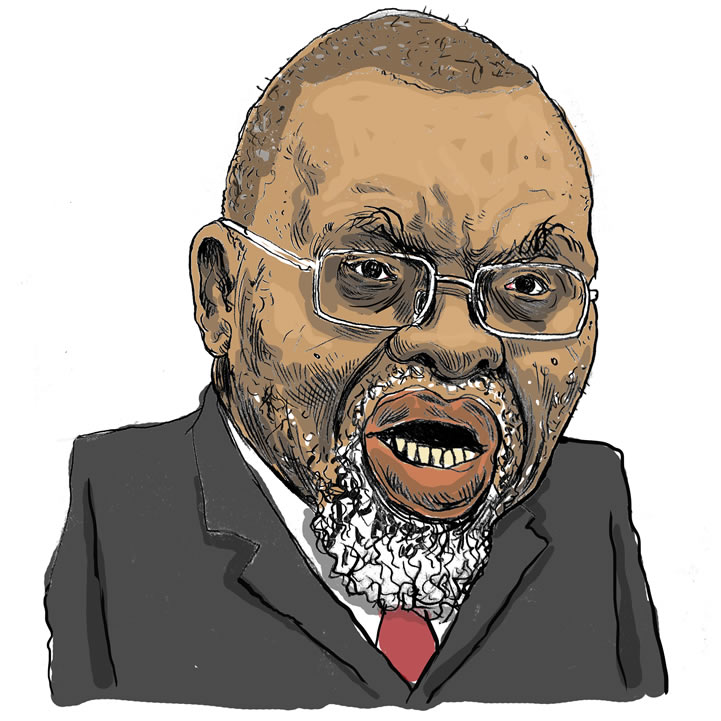In the 2019 Cabinet yearbook, Mantashe will most definitely be voted the minister most likely to embarrass. Like Spud, the fictional character in John van de Ruit’s book of the same name, Mantashe’s tenure ever since he was first appointed a year ago has been characterised by making the news for all the wrong reasons.
From making the headlines over a love triangle involving a younger woman and a fellow Cabinet minister, allegations of impropriety and gratification and flawed appointments to boards of state-owned entities to promoting a non-existent mineral (hazenile) at an international mining conference, where he was supposed to sell the prospects of mining in South Africa, Mantashe’s first year as a minister has been a disaster.
It would be funny if the portfolio he is looking after wasn’t so seriously tied to the country’s bid to claw its way back from “nine wasted years”.
In fairness to him, Mantashe is presiding over a new super-department, which brought together two departments that are in a mess from political and administrative perspectives. Much of this is down to legacy issues.
In the first quarter of this year, mining production declined by 3.5%. In energy, the country has seen a year of rolling power outages.
Mantashe walked into an energy department that completed only 32% of its performance targets, yet spent 98% of its budget.
But, where he can make change, the minister has dallied. There is a great deal outstanding on the policy front, where Mantashe could provide certainty to both investors and residents. The national gas infrastructure plan and the National Energy Regulator Amendment Bill are two crucial examples.
The latter would start to answer questions about Eskom’s unbundling, the introduction of private suppliers of electricity, what is happening with the Grand Inga hydropower project in the Democratic Republic of the Congo, and the targets on clean energy production.
As a mark of how bad things are in the department, the country still does not have even one litre of strategic oil, after 10-million barrels were sold off in a corruption-riddled deal in 2015 under then energy minister Tina Joemat-Pettersson. It has been three years since her replacement, Mmamoloko Kubayi-Ngubane, admitted the stocks were sold and not rotated. Subsequent investigations revealed that senior civil servants were paid to sell the stocks for a song. There has been little action to hold them to account. Litigation, by the Central Energy Fund, to reverse the deal is moving at a snail’s pace. This is why, when the crude oil price changes, South Africa doesn’t have a buffer and so consumers feel the pain.
PetroSA will run out of feedstock for its Mossel Bay refinery sometime next year, and the country seems to have committed itself to oil exploration in South Sudan in a R15-billion deal with no openness, or oil. PetroSA is also technically insolvent.
The Nuclear Energy Council of South Africa and the Central Energy Fund, two critical structures that fall under Mantashe’s purview, are also in a mess and there appears to be no real plan to turn them around.
Mantashe’s decades in political leadership before getting to Cabinet have created a political ideologue who is struggling to come to terms with the complexities of governance.
His new position requires that pragmatism sometimes trumps ideology. These are skills that he has not shown. He adopted a hard-nosed approach to his department’s impasse with the Minerals Council over the mining charter, and the department’s decision to delay opening a new round of bidding to provide renewable energy — when uncertainty of energy is a key factor holding back investment that could kick-start the economy.
The mining industry has raised issues with clauses about empowerment and renewals of mining licences. It claims to have been in discussions with the ministry since the charter was unveiled in September last year.
Instead of responding, Mantashe cites the country’s improved rankings on the Fraser Institute’s annual survey of mining companies as proof of his good work.
Business Day quoted him as saying: “On policy and regulatory certainty, we have jumped 25 spots — from 81 to 56 — in one year. When it comes to investment attractiveness we have jumped five spaces — from 48 to 43 in one year.”
The Democratic Alliance’s spokesperson for mineral resources and energy, Kevin Mileham, believes the inaction is critical. “In this regard, the passing of Deputy Minister [Bavelile] Hlongwa leaves a big hole, as she brought technical expertise to the [energy] portfolio. The minister has promulgated the IRP [Integrated Resource Plan], to his credit, but missed a significant opportunity to immediately address our energy crisis, by opening a new bid window for renewables,” he said.
Mantashe’s mandate is huge and crucial. The economy was built on top of the mineral complex. That industry operates amid uncertainty, and politically-connected companies continue to mine and pollute with impunity.
Without power, there is no economy. As we write this report card, the electricity is off. Eskom might not fall under Mantashe’s mandate (that’s Pravin Gordhan’s problem), but policy certainty and new energy sources do. The minister needs to start working with others, such as the public enterprises department, and fix his super-department.

